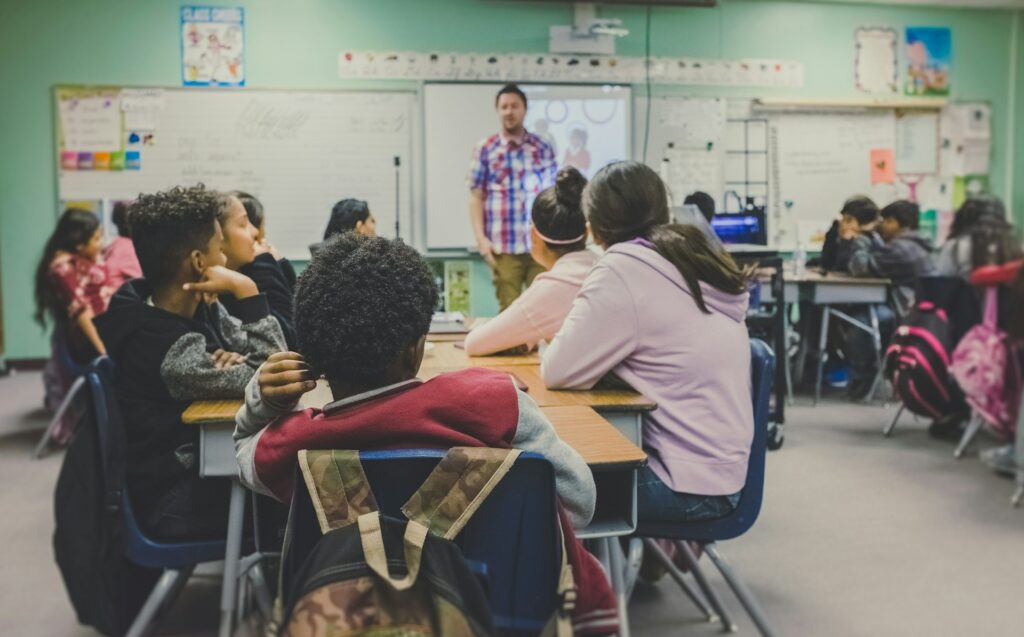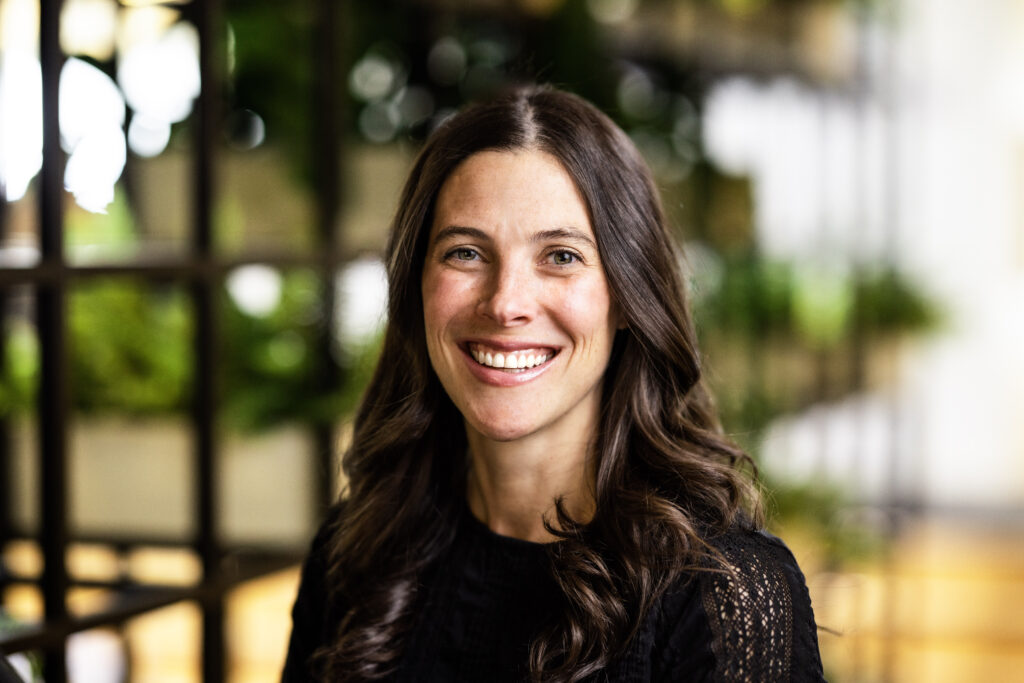
Sophia Vento is a 2023-24 fellow at the Center for Journalism Ethics and an undergraduate student in the School of Journalism and Mass Communication at the University of Wisconsin–Madison.
Today, Americans say that immigration is the top “problem” facing the country while many immigrants say they have faced increased hardship and discrimination since entering the United States. In Chicago since the beginning of the school year, migrant enrollment in Chicago Public Schools has surged and educators are asking for more support from the state’s legislature.

At Chalkbeat, a nonprofit news outlet focused on local education coverage, a team of four are tackling the stories that have emerged as families enter the school system. Becky Vevea, Chalkbeat’s Chicago Bureau Chief, is at the forefront of covering these stories, advising her team of reporters on how to cover migrant communities in schools as stigmatization looms and inequities persist.
Vevea, a 2010 graduate of the UW–Madison School of Journalism and Mass Communication, sat down with us to discuss how Chalkbeat approaches covering migrant communities in Chicago schools, offering insights into challenges faced by reporters and the importance of engaging directly with students and families. This conversation has been edited for clarity and brevity.
How have you seen immigration manifest in your team’s coverage of Chicago Public Schools as of late?
Chicago Public Schools have always served new arrivals. There have been neighborhoods in Chicago that, for more than a century, have been home to new migrants. The school system has experience with a lot of new arrivals.
But we started seeing an influx at the beginning of Operation Lone Star, when the Texas governor started sending buses to American cities like Chicago. We saw at first an influx of just migrants. Over the course of time, more and more families and their children were arriving.
We did request some numbers from the state and from the city to see how many new kids enrolled. We were able to sort of look at enrollment files that the district provides to see where the number of English learners were going up, because there’s a process that schools use when a student is enrolled to determine if they need English language support. Those numbers tell a story.
Also, simultaneously, we have a lot of people who send us tips and talk to us. Teachers and principals will share information with our reporting team. What they’re seeing tells a story before any of it shows up in data or in official press releases.
We’ve taken an approach of following those tips and trying to connect with families. A lot of it has also happened through mutual aid and social service organizations. People who are community providers will say, “We just got a whole bunch of new kids and none of them have backpacks and we need backpacks.” Some of those just land in my inbox as the bureau chief.
What steps does your team take in the reporting and editing processes to ensure fair, accurate coverage? How do you combat the stigmatization of immigration?
Trying to meet people where they are and showing a certain level of humanity and empathy with the stories that they’re sharing because it’s their story. I also think it’s really great to just state it and say it simply and plainly. Stating what you see and explaining the experience without ascribing meaning to it.
I am also on a team within Chalkbeat. I have people of other races and ethnicities who I work with who I feel are very good at talking through what would be the right way to approach the story without being transactional or extractive.
Our story editor Mónica Rhor has done such an excellent job in our editing processes, helping us show that these people have overcome a lot and they’ve made a big, long journey. Many of them are very well educated. They’re trying to make a better life for their families. So, be careful not to imply a sense of helplessness.
There are complicated bureaucracies in our cities and in our school systems that parents who grew up here don’t even know how to navigate. Why would we assume that a parent from another country knows how to get services? We’ve tried to get in their shoes and think about what they’ve experienced and to not ascribe any sort of stereotype when we’re reporting.
What hurdles does Chalkbeat confront in its coverage of migrant communities? How do you tackle these challenges?
One that we’re trying to grapple with is that we don’t have any native Spanish speakers on our team. But not everybody is coming from a Spanish speaking country.
The language barriers are difficult and ones that I feel like we’ve been trying really hard to think through. There are stories we can’t and won’t be able to tell unless we hire somebody who speaks the same language as those immigrants. And that’s something that most modern newsrooms are grappling with and thinking about.
Also, when you do have Spanish speakers or other language speakers on staff, how do you make sure that you’re not asking them to do additional labor that they are not being compensated for? I would rather us sit out a story than to try and not get it right. We’ve tried to be very thoughtful and deliberate about what we are capable of doing.
What have you heard from these communities? How does your team engage with migrants in Chicago?
One of our former reporters actually leads a Spanish speaking outlet called Borderless and we’ve had some conversations with them. They republished one of our pieces about what families need to know about their school rights. They republished it, and they translated it.
Our Colorado bureau has a whole “En Español” section, and we’ve been able to do some work in the Chicago bureau. Through the Institute For Nonprofit News, we started to form a connection where we’re planning to translate a lot more of our work around Chicago’s looming school board elections.
A goal for us is to try to build out our “En Español” coverage so that we can do outreach to say we have coverage that you can access and that you can read that is for you. We just want to make it more accessible.
What are your main tips for a reporter covering the migrant story in education? What is your overarching philosophy or approach to covering immigrant communities ethically?
It’s really important to explain your job to them in as concise a way as possible. A lot of people don’t love the media. But I think when you’re out on the ground, talking to people and especially new arrivals, or migrants who maybe aren’t familiar with American media, explaining what you’re doing, and what you’re there for, is just step one.
I often will pull up our website. I also give people the option to — at any point — go off the record or stop talking. Being thoughtful and not transactional is important. Tell them what you’re doing. Be thoughtful and give them the ability to not answer something. You have a job to do, but they also have a right to not engage with it.
What does holistic, ethical education coverage look like to you?
We believe every child in America deserves a high quality education. And we believe that an equitable education is very important. All of our work has an equity lens to it. All of our work strives to achieve that goal.
One way to get there is to know what is happening on the ground and shine a light on the education in classrooms, education in systems and bureaucracies. Telling the story of what’s happening because you can’t work toward a high quality education for every child if you don’t know what you’re starting working with. We believe that journalism is a path to helping achieve that.
The Center for Journalism Ethics encourages the highest standards in journalism ethics worldwide. We foster vigorous debate about ethical practices in journalism and provide a resource for producers, consumers and students of journalism. Sign up for our quarterly newsletter here.
